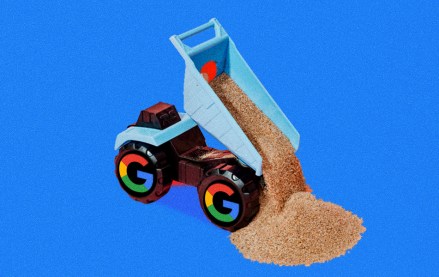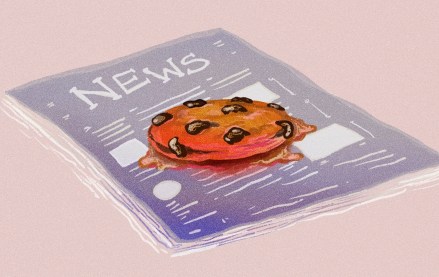
The past year brought with it both good news and bad news for publishers. The good: digital ad spend was up by 20 percent at the beginning of the year, with a total of $17.6 billion spent on digital ads, according to the IAB. The bad news for publishers? They’re not seeing much of that sweet scratch. The total ad revenue booked by Google and Facebook as a proportion of the overall industry account for about 90 percent of all the growth in the business. That leaves media companies fighting it out for the remaining 10 percent.
In short, publishers have a lot to fear — and loathe — in the so-called duopoly.
Facebook and Google are at the front of the minds of many leading publisher executives gathered just outside Lisbon this week for the Digiday Publishing Summit Europe. Many of them had some not-so-nice things to say about the two. So we thought it would be revealing to ask them: What do you love about the duopoly? Publishing execs, under the safety of anonymity, professed admiration for the rigor of Google and Facebook, as well as their focus on user needs.
Swiss media exec
Facebook and Google understand the users’ needs. They have all the data, they know how to read it and integrate it into products like AMP and Instant Articles. The discussions we have in my publishing house sometimes scare me: The users aren’t involved. Publishers create new sites and new apps that aren’t user-tested. Then the KPIs go down and everyone says, “What the fuck just happened?” Facebook and Google test every single development. It’s the arrogance of publishers trying to solve everything on their own, and still compete with Google and Facebook who have the resource.
Irish broadcasting exec
You can admire something without loving it. Publishers really screwed up mobile advertising. I admire what Google has done with AMP. It’s plain common sense: Mobile pages should load fast and not be filled with clutter. It’s a shame it had to come from the duopoly to take the initiative to clean up the mobile experience. AMP is clearly a good step forward. YouTube is good. There is monetization there. It’s great for long tail content. Obviously, we can monetize better on our own platforms. But on YouTube we get some clips that were on TV years and years ago but is popular with some niche group. And that makes money. That’s useful.
U.K. broadcasting exec
Access. And scale. It’s great value. But it’s really really difficult to capture some of that value back. The way they develop some of their products — being a product manager — is especially impressive. There’s a definite professional respect there.
U.K. publishing exec
The reason they’ve done so well has been the use of data. You think about when Google first started, the reason they snowballed as quickly as they did is because their algorithm learned from the data and that went from there. Facebook has delivered such a compelling advertising experience because of the data side. That’s the thing most publishers look at. As we look at how we develop our data capabilities both from a customer’s perspective — in terms of developing our products and marketing our products — and from the advertising side, how can we get as close? We’ll never be as strong as those as those guys. But how can we get as close to their data offerings as possible? For me there are quite a lot of very nimble fast moving startups to midsize tech businesses that are offering a lot of the solutions that the big guns have. They’re so key to us from a partnership perspective.
U.S. media sales exec
The scale which they offer on one hand. And they seem to be making efforts to be inclusive of publishers and to sharing. Facebook is doing something on its instant pages where it’s giving publishers an opportunity to monetize based on their traffic. They’re not holding onto everything, which they could certainly do. I think they’re making steps to play well with pubs. They could do a lot worse. Google, same thing. They at first held their cards closer to their chest than Facebook did. And I think Facebook learned from that, in terms of how Google began to be looked upon as being so controlling. Header bidding has forced Google’s hand a little bit.
More in Media

AI Briefing: How political startups are helping small political campaigns scale content and ads with AI
With about 100 days until Election Day, politically focused startups see AI as a way to help national and local candidates quickly react to unexpected change.

Media Briefing: Publishers reassess Privacy Sandbox plans following Google’s cookie deprecation reversal
Google’s announcement on Monday to reverse its plans to fully deprecate third-party cookies from its Chrome browser seems to have, in turn, reversed some publishers’ stances on the Privacy Sandbox.

Why Google’s cookie deprecation reversal isn’t actually a reprieve for publishers
Publishers are keeping a “business as usual” approach to testing cookieless alternatives despite Google’s announcement that it won’t be fully deprecating third-party cookies after all.





